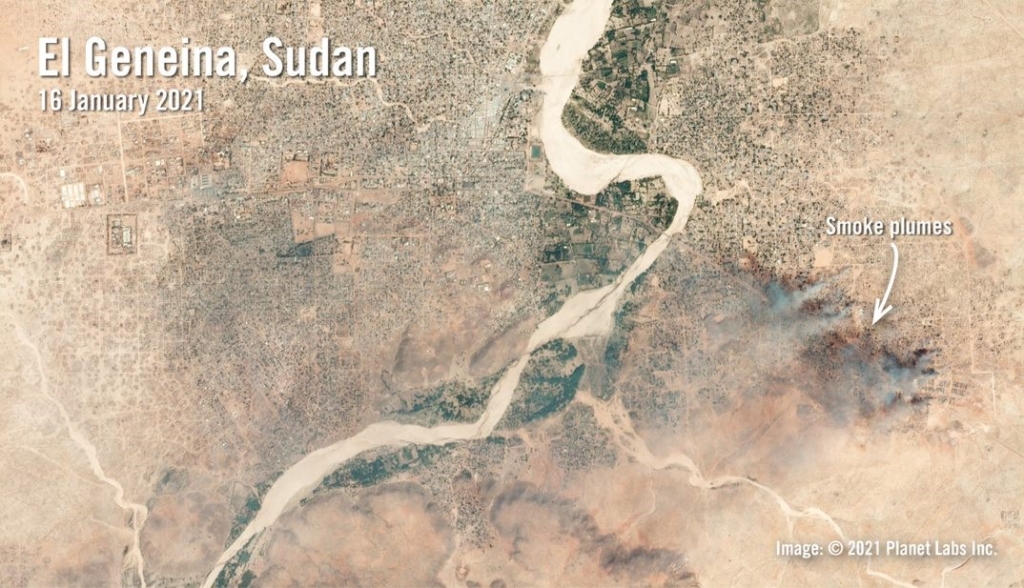The cycle of deadly violence in Darfur is still ongoing. It returned on 16 January 2021 with the horrific attacks on the Krinding camps in El Geneina, the capital of West Darfur State, in which more than 160 people – most of them ethnic Massalit – were killed.
The attack followed the killing of an Arab man by a Massalit man during a quarrel on 15 January. El-Geneina city witnessed a similar revenge attack by some Arab militia at the end of December 2019. The latest attack was a terrible reminder that security remains elusive in Darfur and impunity is still widespread in the long-troubled region.
The deadly attack on the Krindig camps left at least 163 people dead, among them three women and 12 children.
The deadly attack on the Krindig camps left at least 163 people dead, among them three women and 12 children. 217 people were injured. Dr. Osman Hussein from the Doctors’ Committee, a medical doctors’ committee, in West Darfur confirmed to Amnesty International that gunshots to the head, chest, and other body parts led to these deaths and injuries.
The Krindig attack is just part of a wider pattern. Last year, the United Nations (UN) recorded an alarming increase in “inter-communal clashes” in Darfur, with 28 incidents between July and December 2020, an 87 percent increase compared to 2019. The Peace Agreement signed in Juba, South Sudan, in October 2020 has not improved civilian protection, and some communities in Darfur doubt it will ever reduce human rights violations.
The failure of Sudan’s government to protect civilians, alongside the weakness or in some cases lack of justice mechanisms, and the premature withdrawal of the UN-African Union Hybrid Operation in Darfur (UNAMID) have emboldened some tribal militia fighters in Darfur to indulge in gruesome acts of violence.
Even so, the attack on the camps on 16 January, according to many eyewitnesses interviewed by Amnesty International, marks a worrying escalation of this violence. Sudanese authorities must promptly investigate this incident, and the December 2019 incident, and ensure that any perpetrators are held accountable in fair trials through a court of law.
The details of the attacks are horrific. The Arab tribal militia looted and burnt many houses and shops in the Krinding camps and surrounding areas. According to a statement to Sudan Television by the West Darfur governor on 17 January, almost a third of the camps were reduced to ashes. According to the latest flash update by the United Nations Office for the Coordination of Humanitarian Affairs (OCHA) on 14 February, 180,00 people were displaced in El Geneina and the surrounding villages following the Krindig attack.

The Darfur Bar Association reported that the violence was triggered by a criminal act: a Massalit tribesman stabbed a member of an “Arab tribe” to death near the Krinding camps. Although the alleged killer was arrested, relatives of the victim sought revenge and attacked the IDP camps.
Following the attacks, the governor of West Darfur State announced a state curfew and authorized government security forces to use lethal force to protect people and properties. In the week following the violence, the government in Khartoum sent more security forces to West Darfur. The Attorney General’s office in Khartoum also dispatched a delegation to El Geneina to investigate the incident.
According to nine eyewitnesses and survivors of the attacks who were interviewed by Amnesty International, some of whom were injured, the attackers set their houses on fire. Some lost their family members.
Adam (not his real name), a 65-year old resident of the camp, told Amnesty International that the attackers beat him until they broke his left hand, and then set his house on fire.
Adam (not his real name), a 65-year old resident of the camp, told Amnesty International that the attackers beat him until they broke his left hand, and then set his house on fire. He added that “Some of the attackers were wearing the Rapid Support Forces’ (RSF) uniforms, others [were] wearing Chadian army uniforms, and some [were] in civilian clothes. They were riding motorcycles, RSF pickup trucks, horses and camels.”
Another Krinding camp resident, 36-year-old Fatima (also not her real name) said “I was at my house in [the] Krinding IDP camps. We were surprised in the morning when we were attacked by armed militia. They burnt Bursa market. We ran out of the camp. While we were running, the militia shot and killed some people. I lost four members of my family during the attack… some of the attackers were wearing RSF’s uniforms, others in civilian clothes.”
Meanwhile, the Higher Coordination Committee of Rural Nomads, based in Khartoum, explained during a press conference on 18 January that Abusim Hammad, an Arab man, was stabbed to death in El Geneina on 16 January. They alleged that the police shot, on the same day, at his relatives at the morgue and killed one person. They were also shot at in Abusim’s house and at the cemetery.
As was anticipated in December 2020, UNAMID’s premature withdrawal has created a security vacuum in Darfur and exposed civilians to violence. The deadly violence on 16 January is another disturbing reminder of the Sudanese security forces’ systemic failure to protect civilians and the fragility of the situation.
The UN Security Council must re-evaluate the security situation in Darfur and mandate and resource the newUnited Nations Integrated Transition Assistance Mission in Sudan (UNITAMS) to protect civilians in the region until Sudanese military and civilian leaders prove they are willing and able to protect them. Also, the Government of Sudan must ratify the Rome Statute and surrender to the International Criminal Court (ICC) all suspects of war crimes, crimes against humanity and genocide committed in Darfur since 2003.


